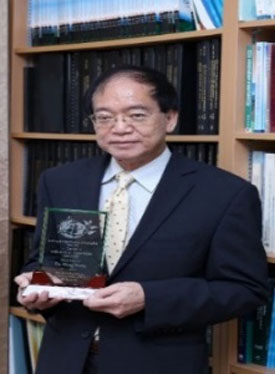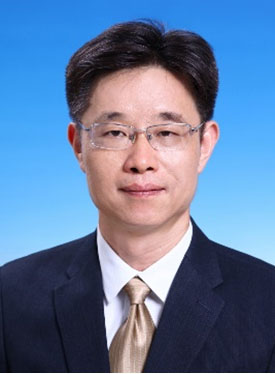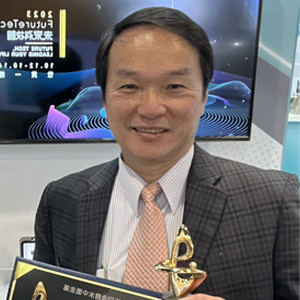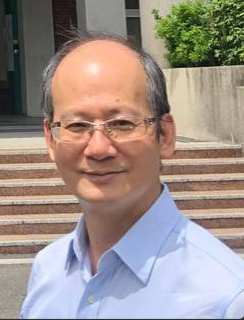Keynote Speakers
Prof. Ming Hung Wong
Advisor/Research Chair Professor (Environmental Science), The Education University of Hong KongSpeech Title: The Roles of Urban Wetlands for Water Purification, Biological Conservation, and Aquatic Production: The Case of Hong Kong, South China
Abstract: Coastal wetlands of Hong Kong have contributed significantly to serving as an essential site for cycling of different elements, improving water quality, flood water storage, protection of erosion, biological productivity, and conservation, etc., citing Mai Po Marshes (RAMSAR site), located at the northwest of Hong Kong as an example. Urban centers generated many persistent toxic substances (PTS), including heavy metals, persistent organic pollutants, and emerging chemicals of concern due to various anthropogenic activities. More recently, wetlands have been built to enhance purifying wastewater, biological conservation, and aquatic production. This presentation focused on the most common PTS encountered in Hong Kong, their biogeochemical processes in the urban ecosystem, their removal efficiencies in different types of sewage treatment plants, and potential adverse effects on the wetland habitats, which might threaten the endangered species (e.g., blackface spoonbill) visiting the RAMSAR site. The roles of constructed wetlands for treating wastewaters (focusing on PTS), providing habitats for a wide range of animals, improving scenic values of waterways, and for environmental education in this densely populated city are reviewed. The information included in this presentation is based on the results of a few research and consultancy projects supported by the Hong Kong Research Grants Council, the Environmental Conservation Fund (ECF) of the Environmental Protection Department, and the Drainage Services Department of the Hong Kong Government.
Biography: Professor Wong is a Foreign Member of the Russian Academy of Sciences, a Member of the European Academy of Sciences and Arts, and Chang Jiang Chair Professor of the Ministry of Education, China. He served as the Editor-in-Chief of ‘Environmental Geochemistry and Health’ (Springer Nature) for 20 years (2002-2023). Professor Wong was the Coordinator of Central and North-East Asia of ‘Regionally Based Assessment of Persistent Toxic Substances’ and a Panel Member (of 3 experts) of ‘Chemicals Management Issues of Developing Countries and Countries with Economies in Transition’, sponsored by UNEP/GEF, during 2001-2003 and 2010-2012, respectively. His research areas included ‘Environmental toxicology’; ‘Ecological restoration’; and ‘Resource reuse’. He has published over 850 SCI papers. In addition to his PhD (Durham), he was awarded two higher Doctoral Degrees based on published papers in 1992 and 2004: DSc (Durham) and DSc (Strathclyde). Recently, he has been awarded an Honorary DSc from the Southern Federal University, Russia (31 May 2024), in recognition of his involvement as the Lead Scientist in the Mega Project on Bioremediation of Polluted Ecosystems sponsored by the Russian Government. Professor Wong is ranked 6th for 3 years and 8th for 2 years (career-long ranking) in Environmental Science according to the World’s Top 2% Scientists (Stanford University, 2020-2024).
Prof. Zhimin Qiang
School of Environmental Science and Engineering, Shanghai Jiao Tong UniversitySpeech Title: Optimizing O3-UV process for wastewater advanced treatment with a novel mini-fluidic experimental system to minimize energy consumption: Chemical oxidation vs. advanced oxidation
Abstract: The ozone-ultraviolet (O3-UV) process, which has emerged for advanced treatment of the secondary effluents (SEs) of wastewater treatment plants (WWTPs), requires optimization that balances the contributions of O3 (chemical oxidation) and hydroxyl radicals (HO•, advanced oxidation) to minimize energy consumption. In this study, a novel bench-scale mini-fluidic O3-UV system (MFOUS) was developed, allowing for accurate determination and convenient adjustment of the key operational parameters including O3 mass loading (ML) and UV fluence (Fp). The degradation of refractory organic compounds in the O3-UV process, expressed by chemical oxygen demand (COD) reduction and biodegradability (i.e., ratio of biological oxygen demand (BOD) to COD) enhancement, was investigated for three typical SEs with different reactivities toward O3. Moreover, an evaluation method for the energy consumption of the O3-UV process was established, enabling fine optimization of operational parameters to balance the contributions of O3 and HO•. For example, to achieve 40% of COD reduction in SE-1, the ML and Fp should be optimized to 0.340 kg m−3 and 0.009 einstein m−2, respectively, resulting in the lowest energy consumption of 7.29 kWh m−3. Through optimizing the O3-UV process for energy conservation, this study will help the WWTPs to achieve carbon-neutral goal in the future.
Biography: Dr. Zhimin Qiang is a distinguished professor at the School of Environmental Science & Engineering, Shanghai Jiao Tong University. He was a recipient of the National Science Fund for Distinguished Young Scholars, and had served as the director of Drinking Water Science and Technology of Chinese Academy of Sciences, and the director of Sate Key Laboratory of Environmental Aquatic Chemistry of China. His research covers advanced treatment, green disinfection, and safe distribution of water and wastewater. Prof. Qiang has led over 40 research projects, published about 250 SCI papers (H index = 62) and 120 Chinese papers, and been recognized as a Highly Cited Researcher by Elsevier in China. He holds 20 innovation patents and has received 8 national/provincial honors and awards.
Prof. Ming-Chun Lu
Distinguished Professor, Department of Environmental Engineering, National Chung Hsing UniversitySpeech Title: Application of Fluidized-Bed Fenton Process for Industrial Wastewater Treatment
Abstract: Rapid population growth and technological advancements in various industries have led to the generation of significant volumes of wastewater requiring effective treatment. Among the available methods, advanced oxidation processes (AOPs) are highly favored due to their high efficiency, cost-effectiveness, and eco-friendly nature. These processes utilize non-selective hydroxyl radicals (•OH) to oxidize and degrade toxic pollutants in wastewater. Among the AOPs, the Fenton process has demonstrated exceptional efficacy in treating recalcitrant organic compounds. However, a key limitation of this process is the generation of large quantities of sludge, necessitating additional treatment and disposal. The fluidized-bed Fenton (FBF) process addresses this issue by crystallizing iron onto the surface of carriers within the reactor, significantly reducing sludge production.
This presentation provides a comprehensive overview of recent advancements in applying the FBF process to treat industrial wastewater. Case studies are explored across sectors such as thin-film transistor liquid crystal display manufacturing, pharmaceuticals, textiles, phenol production, refractory organics, petrochemicals, and other chemical industries. These examples underscore the potential of FBF technology to effectively reduce recalcitrant organic contaminants in wastewater. Key advantages of the FBF process over conventional Fenton-based technologies are highlighted, including improved performance, optimized operating conditions, and critical factors influencing removal efficiency. Additionally, the presentation delves into the reaction kinetics and mechanisms involved, along with the characteristics and selection of carrier materials used in the process. Finally, insights into large-scale applications of the FBF process are discussed, showcasing its viability and adaptability in addressing the challenges of industrial wastewater treatment on a broader scale.
Biography: Prof. Ming-Chun Lu is a Distinguished Professor in the Department of Environmental Engineering at National Chung Hsing University, Taiwan. He has served as an editor for Desalination since 2024 and has been an associate editor for Sustainable Environment Research since 2015. His outstanding achievements have been widely recognized with numerous honors. These include the Platinum Award at the Taiwan Innotech Expo Invention Competition in 2023 and 2024, the prestigious Future Technology Award from the National Science and Technology Council in both years, and the Outstanding Advisor Award for College Student Research and Creativity in 2023. He also led his team to win the championship in the Net-Zero Carbon Technology International Competition hosted by the TECO Technology Foundation in 2023 and was honored with the Outstanding Engineering Professor Award by the Chinese Institute of Engineers the same year. Professor Lu's research interests encompass advanced oxidation processes for water and wastewater treatment, fluidized-bed crystallization technology for treating wastewater containing metallic and non-metallic salts, and carbon dioxide capture from flue gas. He is also an innovator in developing disinfection, deodorization, antimicrobial, and antifungal technologies, as well as oil emulsification and desulfurization techniques. His work not only addresses pressing environmental challenges but also provides sustainable solutions that drive technological advancements.
Emeritus Prof. Chih-Huang Weng
Department of Civil Engineering at I-Shou UniversitySpeech Title: Biochar: an eco-friendly and sustainable material for versatile applications
Abstract: Biochar is a carbonaceous material derived from the partial combustion of biomass wastes. It has been recognized as a sustainable material with various beneficial applications due mainly to its unique properties, which include a large surface area and electrical conductivity, rich pore configuration, high charge density and cation exchange capacity, high pH, and surface functional groups. Over the past decade, significant research interest has been paid to its effectiveness in improving Portland cement composites in construction and soil properties, as well as the benefits of addressing emerging environmental issues. The knowledge of improving biochar’s applicability to sophisticated utilization in contemporary technology-related disciplines has expanded, particularly in its potential for catalyzed applications in batteries and supercapacitors for energy storage systems. This presentation outlines conventional and emerging feedstocks in biochar production, their performance as supplementary cementitious material, and their uses in various environmental applications. Specifically, the removal of pesticides and metals by biochar derived from agricultural wastes is highlighted. The need for future research on promoting biochar in combating climate change, reducing production costs, incorporating machine learning and artificial intelligence in optimizing biochar production and functionality, and establishing an appropriate standard for biochar preparation is also discussed. By focusing on waste utilization and versatile applications, biochar is an eco-friendly material that addresses environmental challenges and promotes a circular economy.
Biography: Distinguished Professor Chih-Huang Weng is currently the Chairman of the Department of Civil Engineering at I-Shou University, Taiwan. He also served as Vice-President of North Kaohsiung Community University, Taiwan. He is serving as the Editor of Water (MDPI), Environmental Geochemistry and Health (Springer), and on the Editorial Board Panel Member of Coloration Technology (Wiley). He has also served as a Guest Editor of SCI journals, such as Agricultural Water Management (Elsevier), Environmental Science and Pollution Research (Springer), and Lecture Notes in Civil Engineering. He has also organized and chaired several international conferences. Professor Weng was listed in the World’s Top 2% of Scientists (Stanford University, 2021-2023). His main research interests focus on using advanced oxidation processes and adsorption to treat wastewater and bacteria inactivation, groundwater modeling, and application of electrokinetic technologies to soil remediation/sludge treatment/activated carbon regeneration.




